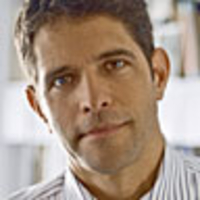In a life crowded with enough high-pitched action-drama, and low-lit psychodrama, to inspire—to date—56 biographies, two successful plays, a Hollywood epic, a television docudrama, and multiplying websites, perhaps no moment was more effortlessly cinematic than the entry of T.E. Lawrence into Damascus in October 1918. Having defeated the Turks, a double victory for the British and his own irregular force of Bedouins, the 30-year-old diminutive Lawrence (a mere 5’5”, but with fierce blue eyes and strong chin), in white desert robes and a headdress with golden band, rode next to his driver in his own dusty, open Rolls-Royce, as Arabs crowded roofs and balconies, chanting his name, “Orens! Orens!” As he later evoked the scene in his extraordinary, over-the-top memoir, Seven Pillars of Wisdom: “A movement like a breath, in a long sigh from gate to the heart of the city, marked our course.”

A latecomer to the challenge of fitting this outsize life to prose—beginning with Lawrence’s own rendition—Michael Korda’s boldly titled Hero: The Life and Legend of Lawrence of Arabia, might seem counterintuitive. The facts, the scandals, the basic timeline, have long been set. While Lawrence’s mother was still alive, biographer Richard Aldington disclosed that his birth in Wales, in 1888, had been illegitimate; his mother was a serving girl in the house of his father, who gave up a title to marry her. Lawrence’s friend, the poet Robert Graves, covered the early years of the scholar-warrior at Oxford (1907-1910)—his college thesis on Crusaders’ fortresses won a “first.” Military historian B.H. Liddell Hart ( Colonel Lawrence) charted his Napoleonic genius for map-reading, devising of a template for guerrilla warfare in the Arab theater in World War I, and conducting “shuttle diplomacy” afterward. Harvard psychiatrist John E. Mack ( A Prince of Our Disorder) was well-suited to treating Lawrence’s later years, and masochism—paying a thug to whip him—until his death in a motorcycle crash, in 1935.
Yet, while “definitive” is an impossible term in the field of Lawrence biography, Korda, a Daily Beast contributor, the former editor in chief of Simon & Schuster and author of Ike, has redrawn the map, and reinvented T.E. Lawrence, coming closest to giving this elusive holograph in a white dishdasha a pulse. Rather than doing “pathography”—Joyce Carol Oates’ term for a prevalent fashion of biographers putting their subjects on the couch, and often belittling them in the process—Korda finds the pass key to Lawrence rather in “heroism,” and it convincingly fits. Instead of being a hero by accident, Korda claims that Lawrence was a larger-than-life hero in the classical sense, someone who “trained himself, from early childhood on for the role.” We intuit his self-image in his toting Malory’s Morte d’Arthur in his battle knapsack; or, later, translating The Odyssey (his 1932 translation never out-of-print), while complaining that Homer was “all adrift when it comes to fighting.” His friend George Bernard Shaw found Lawrence a “grown-up boy,” and so he might have remained, had he not intersected, self-selected for leadership, in 1917, with the opportunity for heroism and extreme behavior presented by the Arab revolt.
“The dreamers of the day are dangerous men, for they may act their dreams with open eyes, to make it possible.”
Lawrence emerged from the conflict, as Korda writes, “the most celebrated, exotic, and publicized hero of World War I,” as the Arab uprising against the Ottoman Empire coincided with British interests in defeating the Turks and their German allies. Given recent history in the region, Lawrence turns out to still be a relevant player today. The author of the oft-quoted definition of counterinsurgency as “like eating soup with a knife,” he introduced new tactics, with some unintended consequences. Indeed, judges Korda, “today’s improvised explosive device, the roadside bomb, and the suicide bomber are all a part of Lawrence’s legacy.” Attending the 1919 Paris Peace Conference, and serving as adviser to Churchill at the Colonial Office, he fought for joint Arab-Jewish governance of Palestine, and opposed the kingship of Ibn Saud, all tantalizing “what might have been” positions.

Lawrence’s reentry into civilian life was rocky. Suffering from post-traumatic stress, he wound up enlisting three times as a private in either the Royal Air Force or Royal Tanks Corps, under assumed names. Each time, the 1920s version of paparazzi found him and trained their telephoto lenses on his barracks. Using an apt analogy, writes Korda, “It was as if Princess Diana had vanished from her home and had been discovered by the press enlisted in the ranks of the RAF as Aircraftwoman Spencer.” A source of Lawrence’s agony was guilt over having betrayed the Arabs, who had fought for their own state, a mirage dispelled at Versailles. Oft blamed, too, was his closeted sexuality. Lawrence was hard-wired to love men, most especially Dahoum, a North Syrian boy he met during an archaeological dig in 1911.Yet the only erotic outlet he ever allowed himself was the kinkier pleasure of being whipped, returning to the scene of the crime of a beating and rape by Turkish soldiers that he found “sexual.”
Lawrence’s final campaign was the writing of Seven Pillars of Wisdom, a project he undertook at Oxford as a “Fellow of All Souls College”—the single credit on his tombstone. As with all his projects, he kept crossing wires in its writing and publication, once losing the entire manuscript, then spending the equivalent of a $1 million to have a limited edition made for friends that the general public could not purchase. Yet, as with all his undertakings, too, the result was singular, the work of an original—both aesthete and, says Korda, “military man manqué.” Its dedication, evidently to Dahoum, is exquisite: “I loved you, so I drew these tides of men into my hands/and wrote my will across the sky in stars.” The tick tock of his war reporting is riveting. And neither Korda nor any biographer has nailed T.E. Lawrence as clearly as he does himself, when he writes, “All men dream: but not equally…. The dreamers of the day are dangerous men, for they may act their dreams with open eyes, to make it possible. This I did.”
Plus: Check out Book Beast, for more news on hot titles and authors and excerpts from the latest books.
Brad Gooch is a professor of English at William Paterson University in New Jersey. His latest book is Flannery: A Life of Flannery O'Connor






